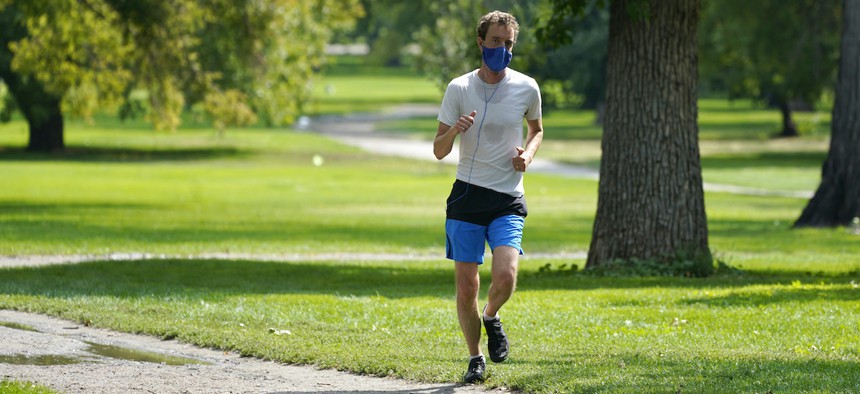Parks Prove Popular During Pandemic—But Budget Cuts Loom

A lone runner wears a face covering while moving along a path in City Park early Friday, Aug. 28, 2020, in east Denver. (AP Photo/David Zalubowski) Associated Press
A June survey by the National Park and Recreation Association found that a majority of Americans consider parks an essential government service, but decreased revenue from the coronavirus pandemic is likely to threaten parks funding in the future.
More than 190 million U.S. residents visited a park, trail, public open space or recreational facility at least once during the first three months of the Covid-19 pandemic, according to a new report from the nonprofit National Recreation and Parks Association.
The fourth annual Engagement in Parks Report, released Tuesday, is based on the results of a June survey of 1,000 adults across the country. This year’s survey was shorter than normal—“because of the dynamic nature of life during the Covid-19 pandemic,” according to the report—and featured just a handful of questions, including how the pandemic had affected frequency of park usage and whether respondents consider public parks an essential government service.
Three in five respondents indicated that they’d visited a park or other recreational space from mid-March to mid-June, and more than half maintained or increased their usage of parks, trails or open spaces during that same time period. More than a quarter of residents also said they had visited parks more frequently during those months than during the same period last year.
That’s not entirely surprising, the report notes, as parks and outdoor spaces offered a reprieve for people on lockdown at home, unable to visit their favorite restaurants and shops or to visit with friends and family members during periods of strict quarantine. Eighty-three percent of park and recreation agencies kept at least some of their facilities open during the initial wave of Covid-19 infections, according to NRPA data.
“In many communities across the nation, parks, trails and other public open spaces have been crucial resources available to people seeking a brief respite from the public health crisis,” the report says. “As businesses shut down operations during the spring, many parks and trails remained open, providing people with opportunities to safely enjoy outdoor physical activity with its many attendant physical and mental health benefits.”
Eighty-two percent of respondents said they felt that parks are essential government services, and 72% said they were more likely to vote for local political candidates who prioritize funding for parks and recreation.
“The Covid-19 pandemic has proven that parks and recreation is fundamental to supporting the physical and mental health of people nationwide,” Kristine Stratton, president and CEO of NRPA, said in a statement. “For these reasons, people expect their local political leaders to provide the financial support needed to ensure these indispensable services continue to be available and are expanded to ensure all people have fair and just access to them.”
But funding for parks could suffer as local governments grapple with revenue shortfalls amid the ongoing pandemic. In a separate survey of state and local leaders in July, 94% of respondents said they anticipated decreased tax revenue to force cuts in a variety of programs and functions.
Those concerns can be seen already in many cities that have already experienced layoffs—local government workforces in July were down 879,000 compared to the same month last year, according to data from the federal Labor Department.
Parks officials are very much aware of the looming economic climate, according to the NRPA report.
“It is already clear that the pandemic-fueled recession will be devastating on park and recreation agency funding, rivaling the damage inflicted by the Great Recession,” the report says. “Falling tax revenues and rising expenses are putting extraordinary fiscal pressures on governments across the nation, and political leaders are having to make many difficult decisions.”
But given the increased importance of parks during the ongoing public health crisis, the report concludes, “it would be myopic for political leaders to put an over-weighted burden on park and recreation budgets.”
Kate Elizabeth Queram is a staff correspondent for Route Fifty and is based in Washington, D.C.
NEXT STORY: New Federal Eviction Moratorium Covers Most Renters Through the End of the Year





